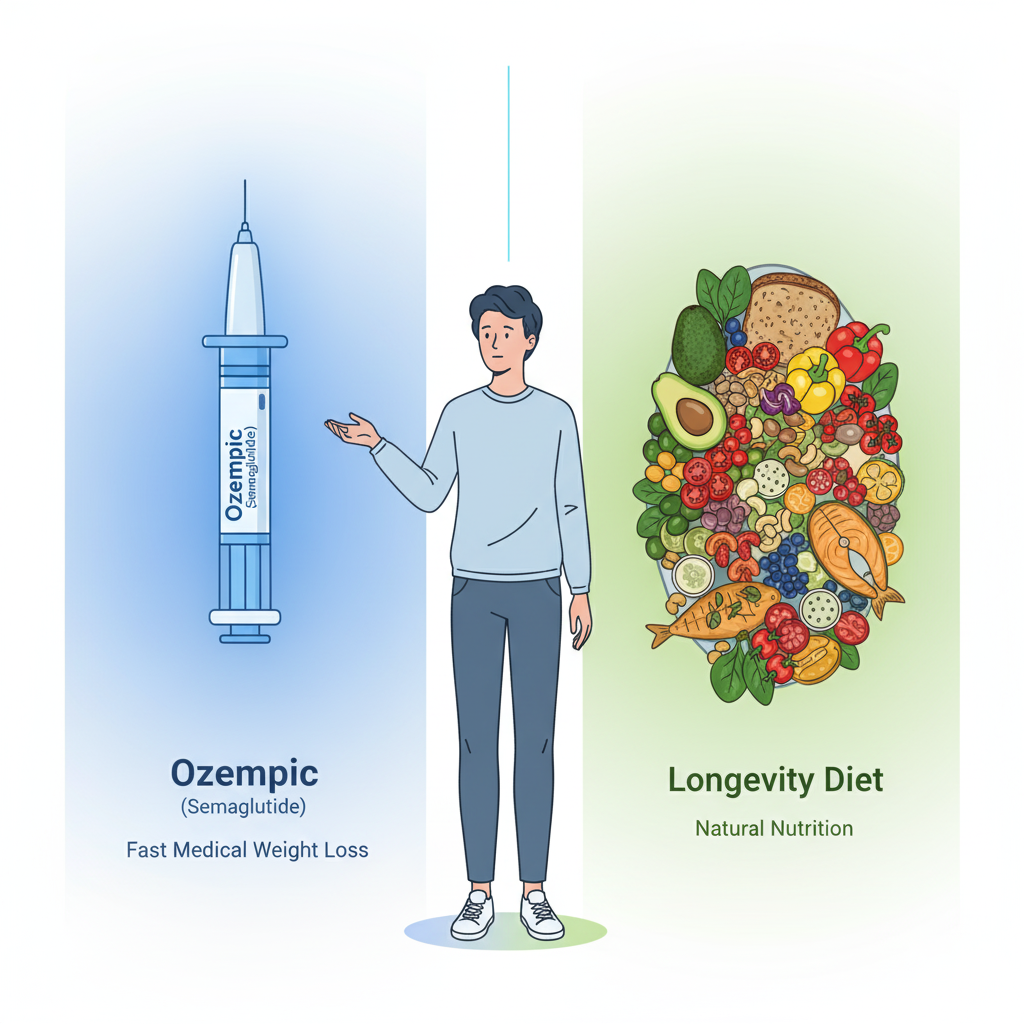Introduction
Weight loss has become one of the most discussed health goals worldwide — and in India too. From lifestyle diets to modern medications, everyone wants a method that works safely and sustainably. Two popular approaches stand out today: Ozempic, a diabetes drug turned weight-loss sensation, and the Longevity Diet, a research-backed eating plan designed for long-term health and metabolism balance.
Both promise results, but they work very differently. So which one is actually better for losing weight and keeping it off? Let’s dive into what experts say.
What Is Ozempic?
Ozempic (semaglutide) is an injectable medication originally developed to manage type 2 diabetes. It belongs to a class of drugs known as GLP-1 receptor agonists, which mimic a natural hormone in your body that controls appetite and blood sugar.
How It Works
-
Slows digestion, helping you feel full longer
-
Reduces hunger and food cravings
-
Lowers blood sugar and improves insulin response
Because of these effects, Ozempic is now widely used for weight loss even in non-diabetic individuals (under doctor supervision).
However, it’s important to remember: Ozempic is a prescription medication, not a lifestyle replacement.

What Is the Longevity Diet?
The Longevity Diet is a nutrition plan developed by Dr. Valter Longo, a leading researcher on aging and metabolism. It’s not a short-term fad, but a long-term eating approach that supports healthy weight management and lifespan extension.
Key Principles of the Longevity Diet
-
Plant-based meals with moderate protein intake
-
Healthy fats from olive oil, nuts, and seeds
-
Limited animal protein (mostly fish)
-
Periodic fasting or time-restricted eating
-
Avoiding ultra-processed foods and added sugars
This diet aims to reduce inflammation, support gut health, and improve metabolic function — all of which help the body burn fat more efficiently and age gracefully.
Ozempic vs. Longevity Diet: How They Differ
| Feature | Ozempic | Longevity Diet |
|---|---|---|
| Type | Prescription medication | Lifestyle and diet plan |
| Works by | Mimicking GLP-1 hormone to reduce hunger | Supporting metabolism and cellular repair |
| Speed of Results | Fast (visible in weeks) | Gradual and long-term |
| Requires Medical Supervision | Yes | No |
| Risk of Side Effects | Moderate to high | Minimal |
| Focus | Weight loss and blood sugar control | Longevity, metabolism, and sustained health |
Weight Loss Effectiveness
Ozempic: Rapid Results
Studies show people using Ozempic can lose 10–15% of body weight over several months. However, this effect plateaus over time and may reverse if the medication is stopped.
Longevity Diet: Steady and Sustainable
The Longevity Diet promotes 2–4 kg weight loss per month depending on calorie balance and fasting patterns. The results are slower but often more sustainable because they come from lifestyle adaptation, not medication dependency.
Side Effects and Safety
Ozempic Side Effects
-
Nausea or vomiting
-
Constipation or diarrhea
-
Fatigue
-
Rarely, pancreatitis or gallbladder issues
-
Possible rebound weight gain after stopping
Expert tip: Ozempic should only be used under doctor supervision, especially for people with existing medical conditions.
Longevity Diet Side Effects
-
Temporary fatigue during fasting periods
-
Nutrient deficiency if not balanced properly
-
May be hard to maintain for people used to high-calorie diets
However, when supervised by a nutritionist, it’s generally safe and risk-free.

Expert Opinion: Which Works Better?
According to health experts, both methods can be effective — but for different reasons.
-
Ozempic is best for people who need medical intervention, such as those with obesity or diabetes, and who have struggled to lose weight through diet alone.
-
The Longevity Diet works better for those seeking natural, long-term, and side-effect-free results.
Experts agree that combining scientific nutrition (Longevity Diet) with medical monitoring (Ozempic, when prescribed) may offer the best outcomes in complex cases.
“Weight loss should never compromise metabolic health,” says Dr. Anita Sharma, Endocrinologist (Quickobook Network).
“The goal is not just losing kilos, but maintaining energy, hormone balance, and long-term wellness.”
Which Is More Sustainable?
While Ozempic can give quick results, many people experience weight regain after stopping it. The Longevity Diet, however, retrains the body to burn fat naturally and improves metabolism over time — making it more sustainable.
Sustainability = Lifestyle, not dependency.
Who Should Avoid Ozempic
Avoid or use only under strict supervision if you have:
-
Type 1 diabetes
-
History of pancreatitis
-
Severe gastrointestinal disorders
-
Pregnancy or breastfeeding
-
Thyroid cancer (rare risk)
Always consult your endocrinologist or diabetologist before starting Ozempic for weight loss.

Practical Tips for Choosing Between Ozempic and Longevity Diet
-
If you need quick medical weight loss: Consult a doctor about Ozempic.
-
If you want long-term results: Adopt the Longevity Diet with professional guidance.
-
Combine both wisely: Medication can help start your journey; nutrition sustains it.
-
Always monitor progress: Regular check-ups, blood sugar tests, and diet tracking matter.
Lifestyle Habits to Enhance Results
Regardless of your method, maintaining a healthy routine maximizes results:
-
Eat balanced, plant-based meals
-
Drink plenty of water
-
Exercise 30–45 minutes daily
-
Sleep 7–8 hours nightly
-
Manage stress through yoga or meditation
These habits improve metabolism, hormone balance, and overall vitality.
Conclusion
Both Ozempic and the Longevity Diet have a place in modern weight loss — one through medical innovation, the other through nutrition science.
If you’re struggling with obesity or diabetes, Ozempic can jumpstart your progress under medical supervision. But if you want a natural, lifelong approach that promotes not just weight loss but also healthy aging, the Longevity Diet might be your best bet.
The healthiest path often blends both science and lifestyle — guided by expert care.
Quickobook Tip
Thinking about weight loss or metabolic health?
Book your consultation with a Quickobook nutritionist or endocrinologist to discuss safe, effective plans customized for your body and lifestyle.
Visit: www.quickobook.com
Disclaimer
This article is for educational purposes only and does not replace medical advice. Always consult a certified doctor or nutritionist before starting any medication or diet for weight loss.
FAQs (50 Expert Answers)
-
What is Ozempic?
A GLP-1 medication originally used for diabetes that also aids in weight loss. -
How does Ozempic cause weight loss?
It slows digestion and reduces appetite by mimicking natural gut hormones. -
What is the Longevity Diet?
A plant-based, low-protein, fasting-inspired diet focused on metabolism and longevity. -
Can Ozempic replace dieting?
No, it should complement lifestyle changes, not replace them. -
How fast does Ozempic work for weight loss?
Results can appear within 4–8 weeks under medical supervision. -
Is the Longevity Diet good for diabetics?
Yes, it helps stabilize blood sugar naturally through balanced meals. -
Which method is safer?
The Longevity Diet is safer for most people; Ozempic requires prescription. -
Can Ozempic cause side effects?
Yes — nausea, constipation, fatigue, and rare pancreatic issues. -
Does the Longevity Diet require supplements?
Sometimes vitamin B12 and omega-3 are advised for plant-based eaters. -
Is Ozempic available in India?
Yes, prescribed by endocrinologists under brand names like Semaglutide. -
Can Ozempic be used without diabetes?
Only under medical advice for obesity management. -
Can I take Ozempic and diet together?
Yes, combining both yields better results. -
What foods are part of the Longevity Diet?
Vegetables, legumes, olive oil, nuts, whole grains, and occasional fish. -
How much weight can you lose on the Longevity Diet?
Around 2–4 kg per month, depending on lifestyle. -
Can I stop Ozempic suddenly?
No, stopping abruptly may cause rebound hunger or weight gain. -
Is the Longevity Diet similar to Mediterranean diet?
Yes, it’s inspired by Mediterranean eating principles. -
Can Ozempic cause muscle loss?
If not combined with protein intake or exercise, yes. -
Does fasting improve longevity?
Intermittent fasting promotes cellular repair and fat metabolism. -
Can I follow Longevity Diet if vegetarian?
Yes, it’s primarily plant-based. -
Does Ozempic affect metabolism?
Yes, it slows digestion but maintains steady energy. -
Is Ozempic addictive?
No, but dependency may develop due to appetite suppression. -
Can Longevity Diet reverse aging?
It slows aging markers through reduced inflammation and oxidative stress. -
Can Ozempic interact with other medicines?
Yes, always inform your doctor about existing prescriptions. -
Does Ozempic improve blood sugar?
Yes, it was originally designed for diabetes management. -
What are the main benefits of Longevity Diet?
Improved metabolism, gut health, and long-term fat loss. -
Is exercise necessary with Ozempic?
Yes, it enhances fat loss and preserves muscle mass. -
Can Longevity Diet be followed lifelong?
Yes, it’s designed as a permanent eating pattern. -
Does Ozempic affect thyroid?
Rarely; monitor thyroid if there’s a history of disorders. -
Can Longevity Diet prevent chronic diseases?
Yes, it lowers risks of heart disease, diabetes, and cancer. -
Can Ozempic cause dehydration?
It may reduce appetite and water intake; stay hydrated. -
Is Longevity Diet suitable for women?
Yes, especially for hormone and metabolic balance. -
Does Ozempic replace exercise?
No, exercise remains essential for long-term success. -
Can the Longevity Diet be personalized?
Yes, nutritionists can adjust for cultural or regional preferences. -
Is Ozempic a permanent solution?
No, results reverse if lifestyle changes aren’t maintained. -
Does the Longevity Diet require calorie counting?
Not strictly; focus on food quality and portion control. -
Can Ozempic cause nutrient deficiency?
Only if appetite suppression leads to low food intake. -
Can I combine intermittent fasting with Ozempic?
Only if approved by a doctor. -
What’s the best time to start the Longevity Diet?
Anytime — it’s flexible and adaptable. -
Can Ozempic be used after pregnancy?
Only after medical consultation. -
Does the Longevity Diet affect mental health?
Yes, improved gut health boosts mood and focus. -
Can Ozempic be used for short-term goals?
Yes, but under strict medical monitoring. -
What if I miss a dose of Ozempic?
Consult your doctor before resuming. -
Can Longevity Diet improve cholesterol?
Yes, it’s proven to lower LDL and triglycerides. -
Does Ozempic cause fatigue?
Yes, mild fatigue may occur initially. -
Can Longevity Diet help hormonal balance?
Yes, through anti-inflammatory foods and fasting cycles. -
Can Ozempic be used by women?
Yes, if prescribed and monitored by a physician. -
Does the Longevity Diet reduce belly fat?
Yes, by improving insulin sensitivity and fat metabolism. -
What’s the best approach for long-term success?
Combine balanced diet, exercise, hydration, and medical guidance. -
Can Ozempic cause withdrawal symptoms?
No, but weight regain may happen after stopping. -
Which is better overall?
Experts favor the Longevity Diet for sustainability and Ozempic for medical cases.









Comments (0)
No comments yet. Be the first to share your thoughts!
Leave a Comment